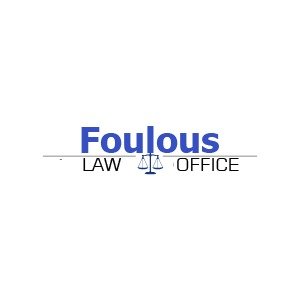Best Art & Cultural Property Law Lawyers in Ilorin
Share your needs with us, get contacted by law firms.
Free. Takes 2 min.
List of the best lawyers in Ilorin, Nigeria
About Art & Cultural Property Law in Ilorin, Nigeria
Art & Cultural Property Law in Ilorin, Nigeria, is a specialized area of law focusing on the protection, preservation, and regulation of art and cultural artifacts. This includes works of art, historical artifacts, and any cultural items of significance to the heritage of Nigeria. Given the rich cultural history of Nigeria, this area of law is crucial in safeguarding indigenous artworks, artifacts, and property from illegal exploitation, exportation, or destruction. In Ilorin, these laws work in conjunction with federal regulations to ensure the protection of cultural heritage specific to this region, promoting the cultural identity and history of Kwara State.
Why You May Need a Lawyer
There are several situations where individuals or organizations might need legal assistance in the realm of Art & Cultural Property Law:
- Ownership Disputes: Conflicts over the rightful ownership of artworks or cultural items, often involving claims from descendants or communal groups.
- Illegal Exportation: The unauthorized sending of cultural property out of Nigeria may require defense or prosecution.
- Theft or Damage: Legal action may be necessary if cultural property is stolen or intentionally damaged.
- Acquisitions and Sales: Guidance is needed to ensure that sales or acquisitions of art comply with local and international laws.
- Restitution Claims: Legal support might be needed to recover artifacts or art that belong to Nigerian cultural heritage but are located overseas.
Local Laws Overview
Ilorin follows both Nigerian federal laws and local regulations regarding the protection of art and cultural property. Key aspects include:
- National Commission for Museums and Monuments Act (1979): This federal law regulates the protection and preservation of monuments, museums, and historical artifacts across Nigeria.
- Customs and Excise Management Act (1958): It prohibits the illegal exportation or importation of cultural properties without appropriate licenses.
- Traditional Rulers and Chiefs Edict: Involves local council regulations relating to the custodians of cultural heritage within Kwara State.
- Penal Code: Addresses theft and damage to cultural property, applying pertinent criminal sanctions.
Frequently Asked Questions
What is considered cultural property?
Cultural property refers to objects, artifacts, and artworks that hold historical, social, or cultural significance to a community, often tied to the cultural heritage of a region.
Who governs cultural property laws in Nigeria?
The National Commission for Museums and Monuments (NCMM) is primarily responsible for the enforcement of cultural property laws in Nigeria.
Can I freely export artworks from Nigeria?
No, exporting artworks or cultural artifacts without proper authorization and licensing is illegal under Nigerian law.
What should I do if I find an ancient artifact?
Notify the local authorities or the National Commission for Museums and Monuments to ensure the artifact is appropriately cataloged and preserved.
Are there any penalties for damaging cultural property?
Yes, damaging cultural property can lead to serious legal consequences, including fines and imprisonment, as prescribed by the Penal Code.
Can cultural property be privately owned?
Yes, but ownership must be compliant with local and federal laws, ensuring artifacts are not subjected to illicit activities or exports.
How can I verify the authenticity of an artwork?
Engage with certified art appraisers or experts in Nigerian cultural heritage for verification and authentication services.
What steps are involved in repatriating cultural property?
Repatriation involves legal claims coordination through the NCMM and international cooperation to return cultural artifacts held abroad.
Do cultural property laws affect local artists?
Local artists must comply with export laws if they wish to sell their works internationally, ensuring proper documentation and licensing.
Is there legal protection for contemporary Nigerian art?
Yes, contemporary Nigerian art is subject to intellectual property laws, protecting artists' rights to their creations and expressions.
Additional Resources
For those seeking more information or needing assistance, consider the following resources:
- National Commission for Museums and Monuments (NCMM): The authority on cultural heritage protection in Nigeria.
- Kwara State Ministry of Culture and Tourism: Provides information specific to cultural preservation in Kwara State.
- Nigerian Copyright Commission: Useful for ensuring legal rights regarding contemporary art.
Next Steps
If you find yourself in need of legal assistance in Art & Cultural Property Law:
- Consult with a Specialized Lawyer: Look for legal practitioners in Ilorin with experience in art and cultural property law.
- Gather Documentation: Collect relevant documentation concerning your case, such as ownership proof, transaction records, or any pertinent communication.
- Contact Relevant Authorities: Engage with authorities such as the NCMM or local cultural bodies for guidance or assistance.
- Consider Mediation: For disputes, mediation might be a more amicable resolution method under legal guidance.
Lawzana helps you find the best lawyers and law firms in Ilorin through a curated and pre-screened list of qualified legal professionals. Our platform offers rankings and detailed profiles of attorneys and law firms, allowing you to compare based on practice areas, including Art & Cultural Property Law, experience, and client feedback.
Each profile includes a description of the firm's areas of practice, client reviews, team members and partners, year of establishment, spoken languages, office locations, contact information, social media presence, and any published articles or resources. Most firms on our platform speak English and are experienced in both local and international legal matters.
Get a quote from top-rated law firms in Ilorin, Nigeria — quickly, securely, and without unnecessary hassle.
Disclaimer:
The information provided on this page is for general informational purposes only and does not constitute legal advice. While we strive to ensure the accuracy and relevance of the content, legal information may change over time, and interpretations of the law can vary. You should always consult with a qualified legal professional for advice specific to your situation.
We disclaim all liability for actions taken or not taken based on the content of this page. If you believe any information is incorrect or outdated, please contact us, and we will review and update it where appropriate.














